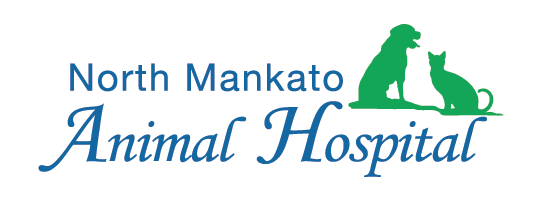Canine Distemper
- Caused by a virus related to measles
- Affects respiratory, gastrointestinal and central nervous systems
- Transmission: Highly contagious, transmitted via airborne droplets from infected dogs
- Signs: Fever, runny nose, watery eyes, may progress to twitching muscles, paralysis, seizures
- Treatment: Fluid therapy, plus antibiotics for secondary bacterial infections
- Prognosis: Potentially fatal
- Vaccination: Recommended for all dogs. North Mankato Animal Hospital requires this vaccine for dogs that will be in hospital/daycare/or here for surgery
Infectious Canine Hepatitis (Canine Adenovirus-1):
- Viral disease that can damage the liver, kidneys, spleen, and lungs
- Recovered dogs continue to shed virus in urine for at least 6 months
- Transmission: Transmitted by ingested of urine, feces, or saliva of infected dogs
- Signs: Fever, thirst, runny nose and eyes, vomiting, bleeding, respiratory disease
- Treatment: Fluid therapy and antibiotics. Blood transfusions may be necessary
- Prognosis: Mortality rate is highest in very young dogs
- Vaccination: Recommended for all dogs. North Mankato Animal Hospital requires this vaccine for dogs that will be in hospital/daycare/or here for surgery
Canine Parvovirus:
- Disease of the gastrointestinal tract. Puppies are most at risk
- Resistant to many disinfectants
- Transmission: Transmitted by contact with infected dogs or their feces
- Signs: Bloody diarrhea, fever, lethargy. Some dogs may show no signs
- Treatment: Fluid therapy, antibiotics and supportive care
- Prognosis: Most dogs recover with appropriate care
- Vaccination: Recommended for all dogs. North Mankato Animal Hospital requires this vaccine for dogs that will be in hospital/daycare/or here for surgery
Rabies:
- Acute viral disease that can affect any mammal
- Transmission: Almost always transmitted via the bite of a rabid animal (often a skunk, raccoon or bat)
- Signs: Sudden, significant change in behavior (irritability, aggression, fear), unexplained paralysis
- Treatment: None. Any unvaccinated animal exposed to rabies should be euthanized or strictly isolated immediately
- Prognosis: Always fatal once clinical signs appear
- Vaccination: Required for all dogs
Bordetella Bronchiseptica and Canine Parainfluenza Virus:
- Often the primary bacteria contributing to infectious tracheobronchitis, an inflammation of the upper airways commonly called kennel cough
- Transmission: Highly contagious, transmitted via airborne droplets from infected dogs
- Signs: Harsh, dry cough, often followed by retching and gagging
- Treatment: Supportive care and cough suppressants
- Prognosis: Can lead to fatal bronchopneumonia in puppies or chronic bronchitis in elderly dogs
- Vaccination: Recommended for dogs in close confinement, such as boarding, dog park, groomer. North Mankato Animal Hospital requires this vaccine for dogs that will be in hospital/daycare/or here for surgery
Leptospirosis:
- Bacterial disease that can cause disease in the liver, kidneys, and other organs
- Transmission: Transmitted through contact with an infected animal’s urine
- Signs: Nonspecific early signs include: fever, lethargy, loss of appetite, joint, and muscle pain
- Treatment: Fluid therapy and antibiotics
- Prognosis: Acute renal failure occurs in 80% to 90% of dogs with clinically significant disease
- Vaccination: Recommended for dogs older than 12 weeks of age where disease is prevalent
Lyme Disease:
- Acquired from infected ticks by both dogs and humans
- Lyme disease bacteria (Borrelia burgdorferi) damage joints, kidneys, and other tissues
- Transmission: Transmitted by the bite of an infected tick
- Signs: Lameness, fever, lack of appetite, lethargy
- Treatment: Antibiotics
- Prognosis: Infection can persist
- Prevention: Vaccination prior to tick season in areas where disease is present, regular topical tick control (Frontline) and the avoidance of ticks

